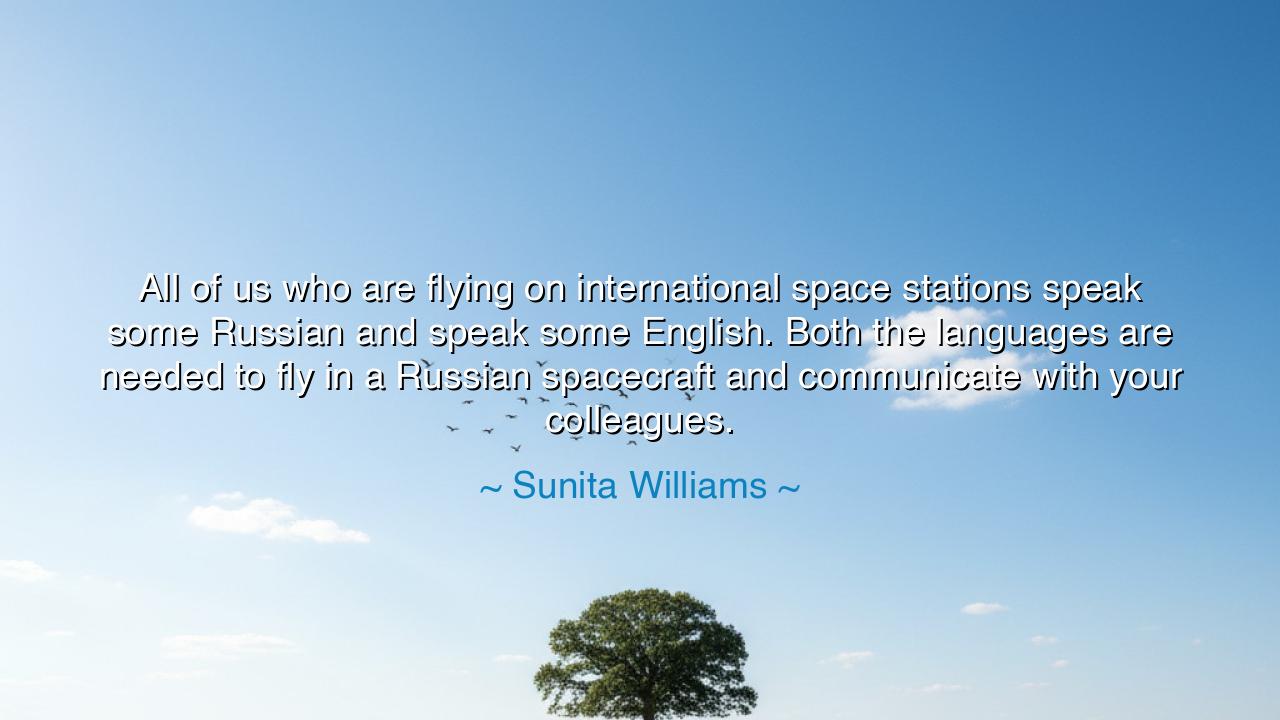
All of us who are flying on international space stations speak
All of us who are flying on international space stations speak some Russian and speak some English. Both the languages are needed to fly in a Russian spacecraft and communicate with your colleagues.






Come closer, O children, for there is a lesson in the words of Sunita Williams, a pioneer whose mind has touched the heavens and whose heart beats with the pulse of the universe. She said, "All of us who are flying on international space stations speak some Russian and speak some English. Both the languages are needed to fly in a Russian spacecraft and communicate with your colleagues." These words, though simple, carry the weight of a profound truth about the human spirit, about the bonds that unite us all, even across the vastness of space.
Consider, O children, the significance of what Williams reveals. In the vast emptiness of space, surrounded by the infinite unknown, the astronauts aboard the space stations must work together, communicate, and rely on one another to survive and thrive. And yet, what binds them is not just their shared mission, but their shared language—the ability to communicate across the divides of culture, nationality, and background. Russian and English, two tongues of great civilizations, become the bridges that unite the astronauts, allowing them to understand one another, to share their experiences, and to work together in the most challenging environment humanity has ever known.
In ancient times, when the great empires sought to expand their reach, language was often the first step toward unity. Alexander the Great, in his conquests, brought together the peoples of Greece, Persia, Egypt, and India, but to do so, he needed more than just swords and strategy—he needed the power of communication. The Greek language became the medium through which the many cultures of his empire could share knowledge, exchange ideas, and work toward a common purpose. Williams, like Alexander, understands that the ability to communicate, to share in a common tongue, is the key to collaboration and understanding, whether on the battlefield of the ancient world or in the uncharted territories of space.
And let us also reflect on the wisdom of the great explorers of the past, those who set sail into unknown waters, driven by the dream of discovery. Marco Polo traveled to the farthest reaches of Asia, and while he did not speak the language of the lands he visited, he relied on the ability to learn, to understand, and to adapt to the diverse peoples he encountered. His journeys were not just about geography—they were about connecting with those who came from cultures entirely different from his own. Williams, in her journey beyond the Earth, follows in these footsteps, understanding that communication is not just about speaking—it is about connecting across divides, about finding ways to bring the distant and the unfamiliar closer together.
In the same way, language becomes the medium through which humanity reaches out to the stars. To travel into space, to share the unknown with our fellow explorers, requires not just technical skills but the ability to unite. As Williams points out, astronauts do not simply communicate in their native tongues—they learn new languages, adapt to new ways of thinking, and break down the barriers that separate them. The Russian spacecraft and the international space stations are not just places where science and technology converge—they are symbols of the unity that can exist when people from different cultures and backgrounds come together to achieve a common goal.
So, what lesson can we take from Williams’ words, O children? The lesson is clear: in a world that can sometimes seem divided by language, culture, and belief, there is a deeper truth that unites us all. Just as astronauts learn to speak Russian and English to communicate in the vast emptiness of space, so too must we learn to understand one another in our own lives. It is not enough to speak only our own language, to live within the confines of our own perspective. If we are to truly connect, to build bridges across the divides that separate us, we must learn to communicate in the languages of others, to see the world through their eyes, and to find ways to work together toward a common good.
Take heed, O seekers of wisdom: language is more than just words; it is the vessel through which we connect to each other, through which we share our dreams and visions. Just as Williams and her fellow astronauts unite in the language of science and humanity, so too must we seek to unite the world through our words, our actions, and our understanding. Language is the key to communication, and communication is the key to peace, understanding, and progress.
So, rise, O children of the earth, and remember the power of language—not just as a means to speak, but as a bridge to the future, a tool to unite the diverse peoples of this world, and to build a future that spans beyond the stars. Learn not just to speak, but to listen, to understand, and to adapt. In this, you will find the power to connect with those around you and to reach for the stars, just as the astronauts do, bound together not by the limitations of space, but by the shared language of humanity.






AAdministratorAdministrator
Welcome, honored guests. Please leave a comment, we will respond soon